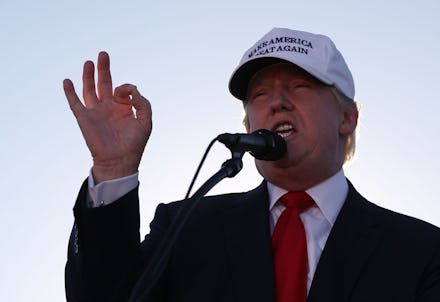Donald Trump's term limits proposal would make the "rigged" system even worse

In his closing pitch to voters, Republican presidential nominee Donald Trump has vowed to "drain the swamp" and impose term limits on members of Congress in his first 100 days in office — an attractive idea to an electorate teeming with anti-establishment rage against what they view as a "rigged" system.
But congressional term limits are not only a bad idea, they've already proved to be unsuccessful in state legislatures across the country, failing to diminish the clout special interests hold or weed out corruption.
Trump and his campaign say their vow to throw the bums out and impose term limits will rid Washington, D.C., of "corrupt" career politicians who they say have done nothing to help kick-start the U.S. economy.
"The time for congressional term limits has finally arrived. Not only will it end our government corruption, but we will end the economic stagnation that we're in right now. No growth," Trump said Tuesday during a speech in Colorado, according to the Washington Post.
Yet studies have found that in California, which became one of the first states to set term limits on their legislative body in 1990, term limits have done nothing to rid the state of career politicians.
"Rather than representing a new breed of 'citizen legislator,' however, new members after term limits behave a great deal like their precursors," a study conducted by the Public Policy Institute of California says. "Many have local government experience and run for another office — for an Assembly or a Senate seat — when their terms expire. Careerism remains a constant in California politics."
Moreover, by imposing term limits on members of Congress, it unintentionally makes lobbyists and the special interests they represent the permanent political class — as they are the one constant amid a constantly changing legislative body.
That gives those lobbyists more influence to help draft and write legislation.
And with a body full of legislators who do not have enough time to grow knowledgeable about the diverse array of policy areas state legislatures are forced to deal with, it makes it less likely that elected officials will know when a proposal would be harmful to the public they have sworn to represent.
"Frequent changes in the membership and leadership of legislative committees, especially in the Assembly, diminish their expertise in many important policy areas," the PPIC study says of the impact of California's term limits. "Many committees lack the experience to weed out bad bills and to ensure that agencies are acting efficiently and in accordance with legislative intent."
Even more fundamental in the argument against term limits is that, at its core, imposing term limits is a tacit acknowledgment that Trump doesn't think voters can be trusted to decide for themselves when a member of Congress' time in office is up.
In fact, all members of Congress have term limits. Voters get to determine every two years in the House and six years in the Senate whether a member is still serving their interests. Those who don't pass that test with voters are voted out.
By imposing term limits, Trump would be telling voters that their judgment over the past 200 years has been wrong.
"A limit on congressional tenure ... is basically antidemocratic," Thomas E. Mann, now a senior fellow in governance studies at the nonpartisan Brookings Institute, wrote in 1978. "It just does not trust the electorate to decide for itself whether an individual should be returned to office or not."
Despite the arguments against term limits, Trump and his campaign are talking up the half-baked proposal in the final days of the race.
Neither Trump nor his campaign aides have given any indication of how many terms he'd limit House and Senate members to.
And facing a daunting poll deficit as Election Day fast approaches, it's unlikely he'll ever get the chance to push for term limits from the Oval Office.
Still, the voters who think Trump's term limit proposal is sound could still push for Congress to take up the idea. They should realize the issue isn't as cut and dry as they think.